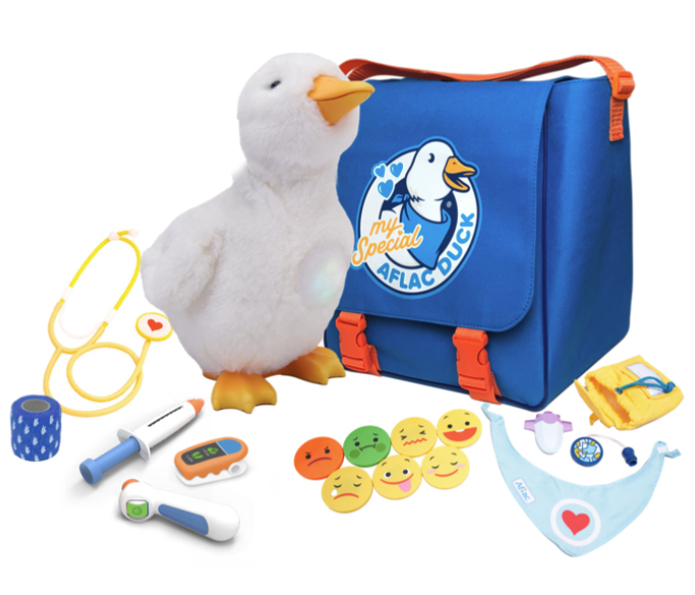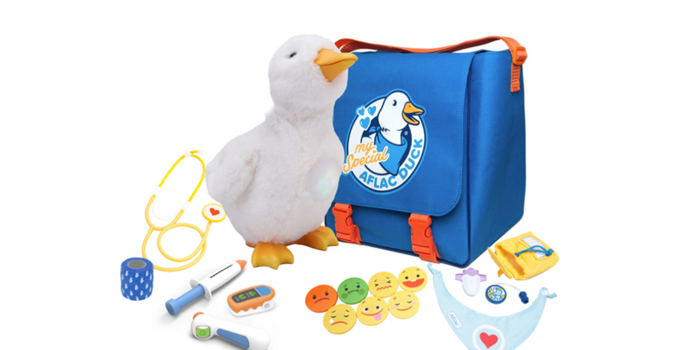For many kids facing cancer and sickle cell diagnoses and treatments at The University of New Mexico Children’s Hospital, expressing emotions can be incredibly difficult. Adjusting to lengthy hospital stays and painful procedures can be daunting. But what if every child facing cancer or sickle cell could have a buddy to help them get through the difficult moments? That’s what one duck aims to do.
Soon a flock of My Special Aflac Ducks will descend on UNM Children’s Hospital. The robotic ducks are specifically designed for kids with cancer or sickle cell disease to help them navigate their procedures and express their feelings. Aflac will be donating the ducks to children during a special event at the hospital.

Laurel Christensen is a pediatric hematology oncology social worker at UNM Children’s Hospital. She works with kids who have cancer, helping them navigate the emotional and social impacts of their diagnosis and treatment. Often, Christensen’s work starts right at the moment a child finds out their life has changed.
“We're essentially pulling the rug out from under them,” Christensen said. “They're coming in used to being fairly healthy and then all of a sudden, they're having to spend all their time in the hospital, and they're not allowed to go to school. They're not allowed to be around a lot of their friends. They're not seeing their siblings as much. Treatment is challenging for them.”
One of the biggest challenges during treatment is telling their family and care team how they feel.
“It’s really hard for kids to know how to appropriately express themselves. That's something that we don't learn until much later in our developmental stages,” Christensen said. “So, when kids are put in these really challenging situations and they're not feeling good, or maybe some days they are feeling okay, but they may feel like it's not okay to feel okay, it can be really difficult for them.”
That’s where the Aflac duck comes in. Buffy Swinehart is Aflac’s Corporate Social Responsibility Senior Manager and says since 1995 Aflac has worked to help causes related childhood cancer and blood disorders and given more than $170 million.
“We wanted to take our mascot the Aflac duck and have it also become a symbol for our philanthropy. It’s a tangible way that Aflac can help make a difference in the lives of children with cancer and blood disorders,” Swinehart said.
Aflac worked with an organization called Empath Labs to design the My Special Aflac Duck. Swinehart said the group worked with more than 100 patients, families, and medical professionals to design every feature of the duck.
Those features include seven emotion coins that can be placed on the duck. When a child holds the coin to the duck’s chest, it will act out the emotions.
“We learned that by asking how a child is feeling and them being able to demonstrate how their duck is feeling, really aided in their communication,” Swinehart said.
Another important feature of the duck is medical play which helps children to feel more in control of their situation. Using medical accessories, they can practice procedures they are going through with their duck.
“The cancer version of the duck comes with a chemo port, when connected creates a calming heartbeat to be alongside the child as they're going through chemo,” Swinehart said. “The child feels less alone because their duck is going through chemo too.”
Christensen has already seen the impact of the ducks on some of her patients.
“I think it teaches them things without them realizing that they're learning things which makes it a really unique educational toy,” she said.
September is Childhood Cancer Awareness Month
The My Special Aflac Duck Delivery will happen in the Child Life Area of UNM Children’s Hospital and will include a scavenger hunt game that will eventually lead to a room where the kids will receive their ducks.
The event, among others at UNM Children’s Hospital this month, is aimed at bringing attention to childhood cancer and cancer research.
Jessica Valdez, MD, MPH, is an assistant professor in the UNM School of Medicine’s Department of Pediatrics, Division of Pediatric Oncology. She’s also in charge of the Children's Oncology Group research in pediatric oncology that involves research with UNM.

Childhood cancer is unique in that it's considered by places like the National Institutes of Health (NIH) as a rare disease because, overall, there are much fewer children who get cancer than adults, but by no means is it a rare disease. If it happens to your child or someone's child that you know, it certainly doesn't feel rare.
“Childhood cancer is unique in that it's considered by places like the National Institutes of Health (NIH) as a rare disease because, overall, there are much fewer children who get cancer than adults, but by no means is it a rare disease,” she said. “If it happens to your child or someone's child that you know, it certainly doesn't feel rare.”
Valdez said treatment of pediatric cancer has come a long way thanks to research with overall survival rates at about 80 to 85 percent, but more needs to be done.
“That's still way too many kids that we lose each year,” she said. “So not only do we need to better understand how to help treat kids, but we also need to better understand why this even happens and get to the root cause.”
Christensen agrees.
“We wish we could put ourselves out of a job. We do,” she said. “But in the meantime, we try to make things less bad, and have fun days, and have fun games and Aflac is definitely coming alongside us with that .”
